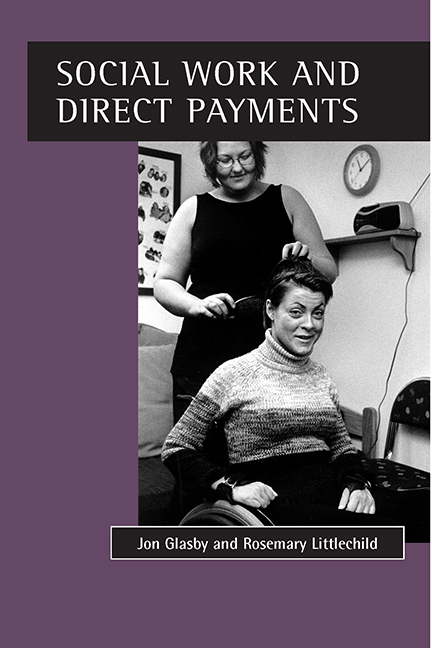Book contents
- Frontmatter
- Contents
- List of tables and boxes
- Foreword
- Acknowledgements
- List of abbreviations
- one Introduction
- two History
- three From indirect to direct payments I: legislation
- four From indirect to direct payments II: guidance and extension
- five The progress of direct payments
- six The experiences of different user groups
- seven The advantages of direct payments
- eight Possible difficulties
- nine Practical issues
- ten Conclusion: implications for community care
- Bibliography
- Appendix Useful resources
- Index
- Related reports from The Policy Press
five - The progress of direct payments
Published online by Cambridge University Press: 05 April 2022
- Frontmatter
- Contents
- List of tables and boxes
- Foreword
- Acknowledgements
- List of abbreviations
- one Introduction
- two History
- three From indirect to direct payments I: legislation
- four From indirect to direct payments II: guidance and extension
- five The progress of direct payments
- six The experiences of different user groups
- seven The advantages of direct payments
- eight Possible difficulties
- nine Practical issues
- ten Conclusion: implications for community care
- Bibliography
- Appendix Useful resources
- Index
- Related reports from The Policy Press
Summary
Although the passage of the 1996 Community Care (Direct Payments) Act was amajor victory for disabled campaigners, the legislation was permissiverather than mandatory (see Chapters Three and Four). Amid considerableconcerns about the cost implications of the new scheme, it was perhapsinevitable that while some authorities would choose to implement directpayments almost immediately, others would be more cautious and possibly evenhostile to the 1996 Act. This has resulted in a situation where the rate ofimplementation has been extremely uneven, creating something of a postcodelottery. Although more and more authorities are starting to introduce directpayment schemes, and although the 2001 Health and Social Care Act empowersthe Secretary of State to issue regulations requiring authorities to makedirect payments, major barriers still remain. Against this background, thischapter reviews the pace of implementation, highlighting key obstacles toprogress. For comparative purposes, reference will also be made to theEuropean Independent Living Movement and to the different direct paymentschemes that have been developed in a number of countries.
Early days
As noted in Chapter Three, research carried out by the PSI two years prior tothe Community Care (Direct Payments) Act suggested that many authoritieswere already making payments to service users and that many more would do soif legislation permitted (see Tables 1 and 2).
Despite this, there were considerable regional variations, with availabilitygradually moving from the south to the north and the west of Britain. While80% of respondents in London were making payments, this was true of only 17%of respondents in the North West, 25% in Wales, 33% in the South West and40% in the West Midlands (see Table 3). The researchers were also at painsto stress that many local authorities were only making payments to a smallnumber of people (Zarb and Nadash, 1994, p 27). Overall, the only exceptionto the concentration of payment schemes in the south was Scotland, wheresuch payments had been legal for some time (see page 55).
After the legalisation of direct payments under the 1996 Act, progress inEngland and Wales has not been as rapid as Zarb and Nadash's (1994)initial research might have suggested. In 1997, the PSI and NCIL publishedpreliminary findings from a research study into the implementation andmanagement of direct payments (Zarb et al, 1997).
- Type
- Chapter
- Information
- Social Work and Direct Payments , pp. 49 - 62Publisher: Bristol University PressPrint publication year: 2002



